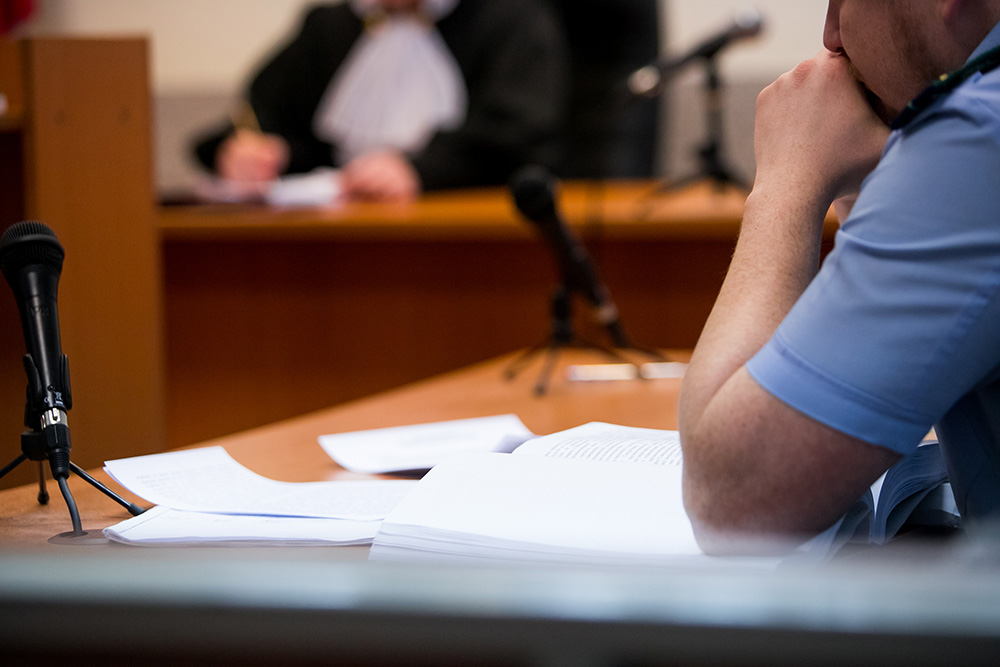Many people facing criminal charges have the same questions. If you’re dealing with the same issues, you’re probably feeling angry, anxious, or even confused. Every case is different, which is why you should contact a Texas criminal defense attorney so you can have the right person by your side. While nothing can take the place of a face-to-face consultation, there are some common questions that people ask when they’re planning their Texas criminal defense strategy.

You should never talk the police without the presence of your attorney. If you’re being questioned by the police, they probably don’t have enough evidence to arrest you and are hoping you’ll make an incriminating statement. Don’t make this costly mistake. Many police officers who get charged with a crime will hire a criminal defense attorney almost immediately, so there’s no reason why you shouldn’t do the same.
A qualified criminal defense lawyer will look out for your best interests by talking to investigators without saying anything that can be used in court, and they’ll look for any information that he or she can use to get your charges dropped or lowered. If you choose to speak with a police office without your lawyer, they can and will use what you say against you in court.
An arraignment is your first court appearance, regardless of whether you have been arrested or taken into custody. It’s when you will be formally presented with any charges that have been made against you, and it’s where you’ll be asked to enter a plea. In the State of Texas, an arraignment is also where the judge will decide on the bail amount and whether you should be detained or released until your trial. If the court decides to keep you in custody, the judge can also decide on the amount of your bail.
Any amount of money determined by the court that will allow you to be conditionally released until your trial is called a “bail.” The purpose of this arrangement is to allow people who are facing criminal charges to be freed temporarily, so they can have the opportunity to prepare for their trial. It also makes sure they come back to court when the day arrives.
People will usually hire bail bond companies to post their bail, and they get reimbursed after they show up in court (minus a premium for the service, which can be up to 10 percent). If they don’t show up for their trial, the company can revoke the bond and hire a bounty hunter to find them. A Texas criminal defense attorney can work with the courts to get the bail amount lowered or removed completely. An can also negotiate with the bond company on behalf of the client, so he or she can secure a lower premium rate.
If you have been charged with a felony offense (such a homicide or some other violent crime), a preliminary hearing will be one of the first steps in the process. During this pre-trial proceeding, the judge will determine whether there’s “probable cause” to pursue a criminal case and where the prosecution has enough evidence to charge you with a crime.
The standards for proof are much lower than an actual trial, but it’s an important step because it will give your attorney a chance to examine the case and put together the right defense. Your attorney may also take the opportunity to dispute any evidence, throw out witness testimonies, and identify any weaknesses in the prosecution’s case.
Also called a “pretrial motion,” a pretrial conference is a legal proceeding that happens before the trial begins. And its purpose is the make sure that it’s “fair and expeditious.” Both parties will sit together with the judge to determine which pieces of evidence and witness testimonies can be used in court. It’s also when your attorney can talk about a possible plea bargain with the District Attorney (such as pleading guilty to a less serious charge or reducing it from a felony to a misdemeanor). The majority of criminal cases never go to trial. Most of them will end through a plea bargain during the pretrial conference.
Probation is an alternative to prison, while parole is a shortened period of time that you’ll spend in prison. If your sentence includes probation, you can suspend your time in jail in exchange for following specific guidelines. This can include any of the following:
· Regularly checking in with a probation officer.
· Attending rehab programs.
· Attending your job or school.
Parole is meant to help people complete their sentence outside of jail after they have served a specific portion of it.
A dismissal can happen when a prosecutor decides to drop your case, which can happen after the assistant district attorney looks at it and decides that the evidence against you isn’t strong enough or isn’t worth prosecuting. In some cases, you can get a dismissal after you perform community service or attend specific classes.
An expungement refers to the process of erasing your case. Related court records are destroyed, which would allow you say on a job or loan application that you have never been convicted of a criminal charge. Expungements are hard to get. So, if you want to know if it’s possible on any of your past criminal convictions, you will need to hire a criminal defense attorney in Corpus Christi.
It will depend on your case and your attorney. Once charges have been filed against you and a verdict can’t be reached before going to trial, you will have to go to court. But if you want to avoid a trial, your attorney might be able to convince the prosecution that your case isn’t worth pursuing. He or she might even be able to prove that the charges weren’t filed on legal grounds, which could lead to a dismissal.
If you’re looking for one of the best criminal defense lawyers in Corpus Christi to help you with your case, be sure to reach out to Gale Law Group.
The police must read the Miranda warnings before interrogating someone in their custody, which is a situation where any reasonable person would conclude that he or she is not free to leave. Any statements volunteered by people in custody without an interrogation can be used against them, even if the police didn’t read the Miranda warnings. An interrogation can not only involve direct questioning but can also involve actions by the police that will most likely elicit an incriminating response from the suspect.
Search and seizure laws apply when the police want to conduct a search that invades a citizen’s legitimate expectation of privacy, which must be objectively reasonable under the circumstances.
A search warrant is a document that’s signed by a judge, and it allows the police to perform a search in a particular place for a specific set of items. They will need to establish probable cause based on their observations or what they have gathered from a reliable informant.
If the police perform a search without a warrant, it’s considered unreasonable unless they can prove that an exception to that requirement justified the search. The police are usually not allowed to perform a search beyond the scope of the warrant — both in terms of the locations being searched and in terms of the items for which the police are searching.
As a citizen, you have rights that protect you from self-incrimination and guarantee you access to legal representation. You’re not required to speak to law enforcement, and you can hire an attorney to represent you. The police are also not allowed to question you if you choose to exercise your right to remain silent.
What you do after you have been arrested can affect the outcome of your case, so you shouldn’t speak to anyone about the situation because you don’t want to accidentally incriminate yourself. Don’t try to run away or resist arrest, and you should always exercise your right to hire an attorney by speaking to a professional as soon as possible.
Both felonies and misdemeanors are criminal offenses in Texas, but they differ in severity. A misdemeanor is a less serious offense that usually carries a penalty of up to one year in jail and may even come with a fine. Some examples of misdemeanor offenses include the following:
– Disorderly conduct.
– Simple assault.
– DUI.
A felony is a more serious crime that can lead to a sentence of one year or more in prison (along with fines and other penalties). Some examples of felony crimes include the following:
– Homicide.
– Sexual assault.
– Drug trafficking.
Be sure to speak to a qualified attorney for more information.
If you find out that there’s an active warrant out for your arrest, the first thing you should do is contact a criminal defense attorney. An experienced lawyer will be able to guide you through the specifics of your particular situation and will be able to take the appropriate action. A criminal defense attorney may even be able to recall your warrant or even have it removed before you can be arrested, but the chances of this happening will depend on the crime that you’re alleged to have committed.
If you’re facing criminal charges, it’s important to analyze your situation. While a private attorney may seem like a costly investment, it can save you money in the long run because it can lessen the severity of the charges that have been placed against you. Private attorneys can recommend expert witnesses or lab tests that can be helpful in supporting your case.
If you’re not financially able to hire a private attorney, a public defender will be appointed to your case. Public defenders are government employees who are often overworked and underpaid, so they won’t have as much time to spend on your case and may even overlook specific details that are necessary to prove your innocence or lighten your sentence.
A deferred adjudication is a special type of probation that you’re placed on for a specific period of time. If you can go through this period without getting into trouble, the charges will be dismissed. And you won’t have a conviction on your record. But if you commit another crime or violate the conditions of the deferred adjudication, you will be found guilty. And the judge can impose any type of punishment within the statutory range of the crime.
If you have any more questions about your case, feel free to contact Gale Law Group. We would be happy to speak with you!
